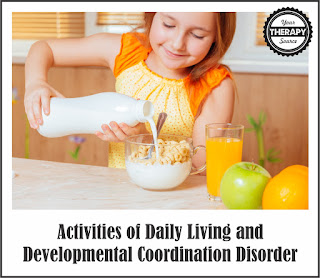ADLs and Children with DCD
Physical Therapy published research on the differences between 25 children with developmental coordination disorder (DCD) and 25 of their peers with typical development for activities of daily living (ADL) performance, learning, and participation, and the predictive values of these aspects.
All of the children’s parents completed the DCD Daily-Q. The DCD Daily-Q is a 23 item questionnaire regarding a child’s ability to complete fine motor activities, self-care and self-maintenance skills and gross motor playing activities. It includes tasks such as buttering a sandwich, cutting a sandwich, pouring juice, opening a wrapper/package, coloring a picture, writing, playing hopscotch, jumping rope and eye hand coordination skills. The results indicated the following:
1. children with DCD showed poor performance of ADL and less frequent participation in some ADL.
2. children with DCD demonstrated heterogeneous patterns of performance (poor in 10%–80% of the items) and learning (delayed in 0%–100% of the items).
3. children in the DCD group with delays in learning of ADL were a predictor for poor performance of ADL, and poor performance of ADL was a predictor for less frequent participation in ADL compared with the control group.
References:
Berdien W. Van der Linde, Jaap J. van Netten, Bert Otten, Klaas Postema, Reint H. Geuze, and Marina M. Schoemaker. Activities of Daily Living in Children With Developmental Coordination Disorder: Performance, Learning, and Participation. PHYS THER November 2015 95:1496-1506; published ahead of print June 4, 2015, doi:10.2522/ptj.20140211
University of Groningen. The DCD Daily Q. Retreived from the web on 12/7/15 at http://www.rug.nl/research/portal/files/14048346/Chapter_4.pdf
By: Your Therapy Source
Summary: 12 hand outs and posters to encourage practicing life skills throughout the year.
FIND OUT MORE at https://www.yourtherapysource.com/lifeskills.html





Comments are closed.